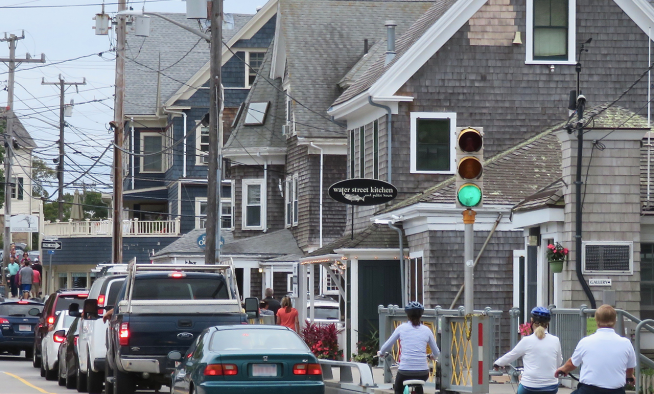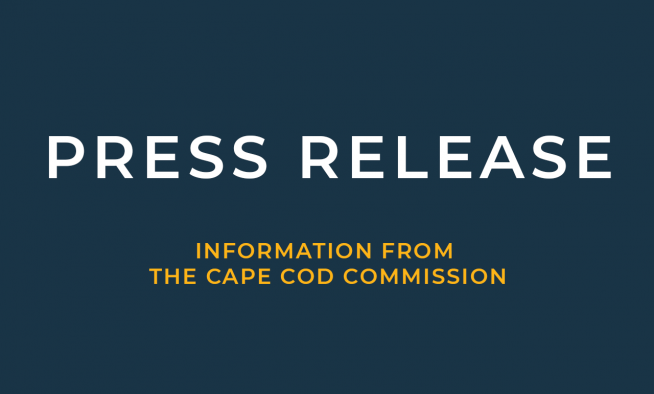Supporting Electric Vehicles on Cape Cod
Transportation is the largest contributor to greenhouse gas emissions on Cape Cod, accounting for 55% of the region’s total. The majority of those emissions—two-thirds—come from passenger vehicles and light-duty trucks. Reducing these emissions is essential for reaching regional climate goals, and a key strategy is transitioning to electric vehicles (EVs).
The Cape Cod Climate Action Plan encourages the region to support low- and no-carbon transportation alternatives, expand charging infrastructure, and promote programs that increase EV adoption. Since 2020, EV ownership on Cape Cod has nearly tripled, and charging infrastructure continues to grow. The Cape Cod Commission supports this progress through a range of initiatives, including several new programs focused on expanding EV access, improving infrastructure, and promoting equity.
Expanding Infrastructure Through Municipal Partnerships
The Cape Cod Commission is working with Charging Smart, a technical assistance and designation program funded by the U.S. Department of Energy. Charging Smart aims to remove barriers to electric vehicle adoption and economic development. The program provides free, personalized technical assistance to help municipalities align their local policies with best practices to facilitate the expansion of EVs in their community. The Commission will be helping support local governments in the region to access the program’s benefits and earn recognition as EV-friendly communities. Currently, the Commission is working with the towns of Brewster, Chatham, Orleans, Sandwich, Truro, and Yarmouth.
Supporting Rideshare Drivers with Financial Incentives
Rideshare services such as Uber and Lyft are becoming more prevalent across Cape Cod. To support cleaner transportation options within this growing sector, the Ride Clean Mass program offers financial incentives to Massachusetts rideshare drivers who purchase electric vehicles. Eligible drivers—those who have given at least 300 rides or driven 1,500 miles in any two of the past four quarters—can receive rebates on new, used, or rental EVs. Vehicles must be purchased after November 12, 2024, and must qualify for the Massachusetts Offers Rebates for Electric Vehicles (MOR-EV) rebate program.
In addition to Ride Clean Mass, the MOR-EV program provides further incentives for battery-electric and hydrogen fuel cell vehicles. Plug-in hybrids are not eligible under MOR-EV. Some rebates can be applied at the dealership, while others require pre-qualification or submission after purchase. The Federal Clean Vehicle Tax Credit is also available either as a point-of-sale discount or when filing federal taxes, provided the vehicle is purchased from a dealership registered with the IRS. It’s important to note that leased vehicles are not supported under the Ride Clean Mass program.
Improving Access for Low-Income Residents Through EV Carsharing
Recognizing the need for equitable transportation solutions, the Cape Cod Commission is collaborating with Equal Energy Mobility, the Massachusetts Clean Energy Center, Preservation of Affordable Housing (POAH), Zipcar, Voltpost, and Better Together Brain Trust (BT2) to launch an innovative EV carsharing program. This initiative aims to improve mobility for low-income residents by providing affordable, shared access to electric vehicles.
This cross-industry initiative will place electric carshare vehicles operated by Zipcar and install charging infrastructure utilizing traditional EV chargers and innovative lamppost retrofit technology at several POAH affordable housing developments in Barnstable County. This convenient and affordable model addresses personal transportation needs without requiring individual car ownership and reflects a broader commitment to inclusive electrification and sustainable mobility.
State Support
The Healey-Driscoll Administration will soon announce dedicated grant funding for the purchase or lease of electric vehicles for publicly owned fleets, electric school buses, waste collection vehicles, and other vocational vehicles. Additionally, the Administration, in coordination with the Electric Vehicle Infrastructure Coordinating Council, will announce enhanced future grant funding opportunities for existing programs that support medium- and heavy-duty vehicle charging, charging at multi-unit dwellings and educational campuses, charging at workplaces and for commercial fleets, and publicly accessible charging stations through the MassEVIP program.
Learn More
More information about available rebates and eligibility can be found at ridecleanmass.org, MOR-EV.org, and fueleconomy.gov for details on federal EV tax credits.
Related Posts




